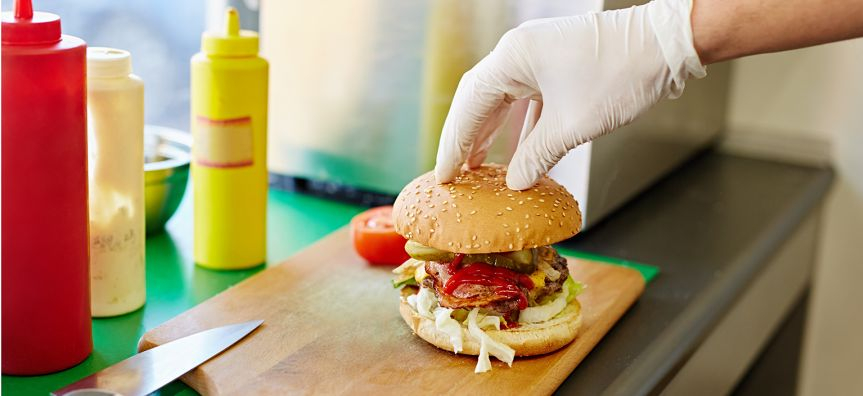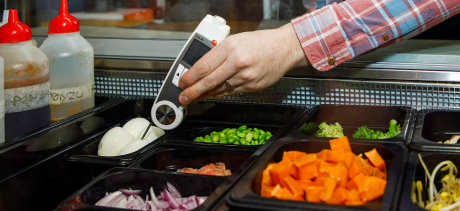
We check all local food businesses to make sure their produce is safe. Council has a legal obligation to inspect food premises and enforce NSW Food Authority requirements. We support your success by offering essential information on your legal obligations as a food business.
New food safety standard
A new food safety standard for retail food businesses came into effect on 8 December 2023.
The Standard was developed by Food Standards Australia New Zealand and applies to organisations that handle unpackaged, ready-to-eat foods including previously exempt school canteens and childcare centres. Read more.
Starting a food business
All NSW food businesses (including Mobile and temporary food stalls) must register with Council details of where they intend to trade. Registration is free by completing a Food Business Owner Details Form.
All food premises must comply with the Australian Food Standards Code. Food handlers must also know these laws and regulations.
Food handler courses
Council's Food Handler Courses are currently being redeveloped and new dates will be provided soon. A new consistent approach to food safety education will soon be adopted across the entire Northern Beaches. To find out more or to express your interest, call us on 1300 434 434.
Food safety supervisors
While Council offers in-house Food Safety Education some businesses are further required to have a Food Safety Supervisor (FSS). FSS requires training and certification, governed by the NSW Food Authority. Find a Registered Training Organisation (RTO)
Food inspections
Council conducts random, unannounced inspections of food premises across the Northern Beaches. These inspections determine whether premises are clean, food handlers have appropriate skills and that food is safely prepared and stored. There are fees for these inspections.
Inspection fees and charges
Under the Food Regulation 2010 Councils are able to charge an administration fee to all food businesses subject to inspection during the financial year. The fee is designed to enable Councils to recover more of the costs associated with regulating food businesses.
Under the legislation, this fee must be charged on a sliding scale based on the number of food handlers working in each business. The law also establishes a maximum amount that Councils can charge.
To minimise the impact of this new fee, previous fees for the first planned inspection of the financial year has been abolished. the charge has been set below the maximum permitted. Concessions are also provided for businesses which achieve a 5 STAR compliance rating or are operating a charity or community-based organisations (with evidence).
Reduced inspection frequencies of 18 months or two years for the best performing businesses also further reduce financial impacts from Council inspection.
These changes will mean reduced costs for many businesses, particularly those with good standards. Conversely, poor performing businesses, which require more intervention, should expect to pay more.
The administration fee will support improved education and training to businesses in the near future.
Penalties and enforcement
Penalty Infringement Notices (PINs) range from $330 for an individual to $880 for a corporation. PINs relating to food hygiene are publicly displayed on the NSW Food Authority’s Register of Penalty Notices.
Improvement notices
An Improvement Notice is a legal document requiring directions by a specific date and a $330 fee applies.
Prohibition orders
Prohibition orders can be placed on the premises, part of the premises or a piece of equipment that is a threat to public health.
Prosecution
Noncompliance with the Food Act 2003, including breaches of the Food Standards Code, can result in Council taking the business owner to court. Maximum penalties for failing to comply with the Food Standards Code under the Food Act 2003 is $55,000 for individuals and $275,000 for corporations.
Food Businesses Forms
Use this form to apply for registration of an event which will include temporary food stalls / mobile food premises.
This form can be completed to request an inspection, prior to sale or purchase of a business, prior to occupation, or for the purpose of a fit-out consultation.
Where this inspection is being requested to provide sign off for a final inspection prior to the issue of an Occupation Certificate, you are required to complete all the fields of this form to verify that critical works have been completed prior to booking the inspection.
Note: A new food business must submit a Food Business Owner Details Form to Council’s Environmental Health Team and obtain a registration number prior to submitting this form.
Approval is needed to sell food from a vehicle in a public place.
Individual stall holders should complete this form to apply for Temporary Food Premises in Northern Beaches Council area.
Documents
Useful links
- Food Act 2003
- Food Regulation 2010
- Food Standards Code - Including the Food Safety Standards
- NSW Food Authority
- Food Standards Australia and New Zealand
- Labelling Fact Sheet - NSW Food Authority
- NSW Legislation
- Name and Shame
- NSW Food Authority's Register of Penalty Notices
- NSW Food Authority - Food Safety Supervisors
- Food businesses


